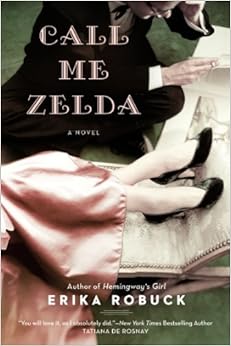I know I've not been blogging lately, for which I am profoundly sorry. The truth is, I haven't had a great deal to say and so I have remained silent. As I alluded to in my last post, it has been terribly busy this fall. I'm hoping to wrap up a consulting project and four book reviews for the HNS in the next couple of weeks, so I should have a bit more time on my hands as we cruise into the holiday season. This makes me very happy as I love Christmas. I love picking out a Christmas tree (real, of course!), getting it decorated listening to old Christmas records, hosting my annual holiday shindig (complete with a Christmas themed movie such as "Die Hard"), and general holiday related shenanigans.
Although I'm waiting for things to settle down, I thought to start posting my reviews for Historical Novel Society here on the blog.
First up is Call Me Zelda is by Erika Robuck and follows the tempestuous years of Zelda Fitzgerald's confinement for schizophrenia. Though recent research seems to think that Zelda suffered more from Bi-Polar Disease (mania with fits of depression), the psychological community was unfortunately not as advanced in the 30s. This novel is told from the perspective of Anna Howard, a lonely psych ward nurse who becomes a paid companion to Zelda and her moody husband Scott Fitzgerald.
At first Anna is in awe of her newest patient at the Phipps Psychiatric Clinic in Baltimore, Maryland. Zelda is a fading flapper menaced by schizophrenia. Through the catatonia and fits of instability, Anna manages to forge a connection to her patient, not knowing that it will be Zelda who forces her to re-examine a past marred by tragedy.
 Call Me Zelda is moving and brilliantly crafted. Robuck deftly captures the tempestuous and highly-strung marriage of Scott and Zelda Fitzgerald, interweaving their story with Anna’s own tragic past. Though set in the waning years of the Fitzgeralds’ popularity, the heady days of the 1920s still make an epic appearance through Zelda’s reminiscences. The Depression years are also rendered well, corresponding to the emotional desert that narrator Anna feels in the wake of her husband’s mysterious disappearance and the death of her much-loved daughter.
Call Me Zelda is moving and brilliantly crafted. Robuck deftly captures the tempestuous and highly-strung marriage of Scott and Zelda Fitzgerald, interweaving their story with Anna’s own tragic past. Though set in the waning years of the Fitzgeralds’ popularity, the heady days of the 1920s still make an epic appearance through Zelda’s reminiscences. The Depression years are also rendered well, corresponding to the emotional desert that narrator Anna feels in the wake of her husband’s mysterious disappearance and the death of her much-loved daughter.The only, barely discernible quibble is the disjointed feel of the first and second “acts” of the novel. The first part closes after Zelda sinks further into madness and is committed to a private but inhospitable mental clinic, severing all ties to her favorite nurse. The second picks up some twelve years later; Anna has had a second chance at happiness and is settled and at peace, but she never reconciled the final, traumatic parting from her beloved friend and patient. As Zelda reaches out over the space of time, Anna is forced onto a trouble-filled road trip to achieve her former patient’s last request. The conclusion is bittersweet but will not come as a surprise to those readers familiar with Zelda Fitzgerald’s sad ending.
I highly recommend this book to all lovers of historical fiction. The editors of the Historical Novel Review made the novel a quarterly "Editor's Choice", so it is well worth the read.
Next week, A Hundred Summers by Beatriz Williams. Easily my favorite book of the year! Until then, happy reading (and writing)!
No comments:
Post a Comment